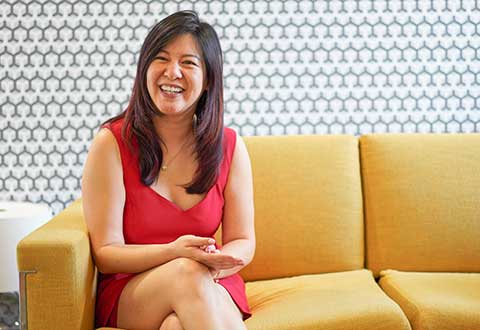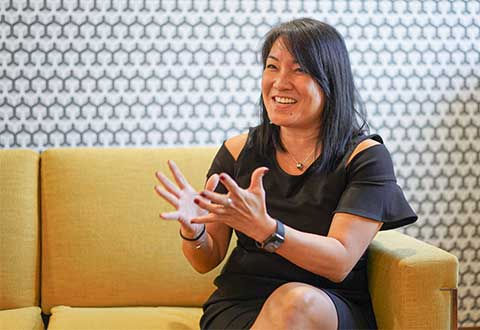(left) Caroline Tham, Assistant Director, Development Department, KK Women’s and Children’s Hospital, and Mathilda De Boer, Assistant Director, Division of Community Outreach & Philanthropy, National Cancer Centre Singapore.
Philanthropy allows us working in healthcare to dream big, whether it’s pushing the boundaries of science to discover a cure for cancer, harnessing technology to predict and prevent serious illness or ensuring healthcare workers have what it takes to face tomorrow’s health challenges.
In this three-part series, we hear from development officers who work behind the scenes to make philanthropic support happen for SingHealth. They share their journeys, triumphs and challenges in championing healthcare philanthropy.
Mathilda & Caroline
Mathilda De Boer, Assistant Director, Division of Community Outreach & Philanthropy, National Cancer Centre Singapore (NCCS), moved from a career in advertising to development some 11 years ago. She now leads the development team at NCCS.
Caroline Tham, Assistant Director, Development Department, KK Women’s and Children’s Hospital (KKH) joined her team in 2013, making a career switch from the education sector. She now leads the Development Department at KKH.
Q: What made you choose a career in development?
Caroline: I studied theology and education. Before this, I worked in a non-profit organisation where I edited books and commentaries, and then moved to an administrative role at a university. Even though I had no prior experience in Development, I saw it as an opportunity to try something new and meaningful. I’m very fortunate that my bosses took a chance on me.
Mathilda: After I made the switch from advertising, my first job relating to development was in 2006 when I worked in the arts. The focus was to secure both in-kind and cash sponsorships in exchange for some form of acknowledgement, to offset our production costs. The concept of ‘Development’ was not common at the time so the management parked this portfolio under the corporate communications and marketing department that I was part of. 7 years later, I joined the Development Office of a medical school and that is where I got exposure to true philanthropy, where donors support your mission financially without expecting anything in return.
Q: How has your journey as a development officer been like? Any memorable moments or anecdotes to share?
 Caroline: I was hired to manage donor stewardship and the job has been a perfect fit because I love interacting with people for a great purpose. Imagine being paid to be nice to people and develop meaningful programmes at the same time!
Caroline: I was hired to manage donor stewardship and the job has been a perfect fit because I love interacting with people for a great purpose. Imagine being paid to be nice to people and develop meaningful programmes at the same time!
Because I was new to development, I didn’t come with contacts. I remember in my first year, when I was graciously invited to attend an external event. I didn’t know what to expect, but I told myself to have an open mind and see how things go. During the event, I met a very pleasant lady and we ended up going to dinner together. That’s when I found she handles the CSR for her company and the company subsequently made a multi-million dollar donation to the KKH Health Fund. It is always good to have hope and expect the unexpected!
Grateful patient giving is another source of inspiration. I get to meet amazing patients and their families, who have been touched deeply by our staff who went above and beyond to help them in their journey. Sometimes, I hear of children’s lives who have been saved because of the swift and excellent care of our staff. Other times, loved ones may have passed away, yet their family desires to make a gift in appreciation of the compassionate and committed care that their loved ones received while in the hospital. Being able to help orchestrate philanthropic opportunities for these families and our staff is a real privilege that I don’t take lightly.
Mathilda: When I was still a rookie in development, I used to get very disheartened by the number of rejections I got. During one of these low points, I felt like I was a ‘professional beggar’. Then someone enlightened me that I was in fact an “Architect of dreams”. I realised that it is true, because there are many donors who want to make an impact and as development officers, we create programmes that enable them to do so. Even though starting out in this path was challenging, as I gained experience, I learnt to strategise and prospect the right people. There’s always the right prospect, right connector, right place, right time and right amount.
Recently, I’ve also been able to go beyond the oncology space to develop cross-disciplinary programmes in partnership with other SingHealth institutions, in areas such as palliative care and geriatrics. This helps us as a cluster, deliver holistic and person-centred care to our patients. SingHealth institutions cover many disciplines, so the possibilities are truly endless.
Q: What do you find is the most rewarding thing about being a development officer and why?
 Mathilda: I think nice people keep us in our jobs, and we meet so many of them during the course of our work. About a year ago, we received a gift of $100,000 in memory of a patient who had passed away. At that time, the husband was still grieving the loss of his beloved wife, but the family decided to make the gift because they were grateful for the care she had received at NCCS. When we met with him recently to show him a recognition plaque that we had put up in his wife’s name, he was visibly touched by the unexpected gesture. For me, it was so fulfilling to steward the donor in a way that was meaningful for him. It clearly meant a lot to him because after that meeting, the donor decided to make another gift.
Mathilda: I think nice people keep us in our jobs, and we meet so many of them during the course of our work. About a year ago, we received a gift of $100,000 in memory of a patient who had passed away. At that time, the husband was still grieving the loss of his beloved wife, but the family decided to make the gift because they were grateful for the care she had received at NCCS. When we met with him recently to show him a recognition plaque that we had put up in his wife’s name, he was visibly touched by the unexpected gesture. For me, it was so fulfilling to steward the donor in a way that was meaningful for him. It clearly meant a lot to him because after that meeting, the donor decided to make another gift.
Caroline: What I find rewarding is helping to create different programmes in partnership with our clinicians and allied health professionals, for patients in need, research, and local and regional education initiatives.
Philanthropy opens the door for dreams to come true, not just for the donor, but also for our staff. It ultimately impacts the lives of our patients and families, and beyond into the future. At the beginning, it was challenging as clinicians are stretched caring for patients. But once they see the impact they can make with philanthropic support for our patients, they usually are much more open to partnering us. It is most satisfying when clinicians come back to you with more proposals for new projects they want to embark on and the cycle goes on.
Q: What is one challenge that you face as a development officer? How do you overcome it?
Mathilda: Most successful gift cases are a collective effort. It does not end with a donor and a specific gift purpose. Researchers identify specific priorities within their research or education work; clinicians connect us with grateful patients who are interested to give, and on the administrative front, colleagues across many departments ensure that due diligence, proper governance and approval processes are followed.
It is important to get everyone’s perspectives aligned before we can proceed with a donation - it is a long-drawn process, so perseverance and resilience are important.
Caroline: As Mathilda shared, we work with many different stakeholders, and finding the balance between encouraging dreams and managing expectations can be challenging, but it is also extremely rewarding when everyone sees the programmes’ impact upon completion.
Along the way, I have encountered the challenge of donors who offer to make a gift with a very specific intent that we aren’t able to fulfil, and we have had to very regretfully decline. However, I believe it is important to be open and honest with our donors to ensure proper stewardship and accountability of their gifts.
Mathilda: I agree with Caroline, and having that level of transparency with the donor can help you build trust and form stronger bonds. That’s what fundraising is all about, building strong relationships.
Q: What advice can you give someone considering or starting out a career in development?
Mathilda: I’d say “Go for it!”
Being a development officer is not about sitting behind a desk and churning out paperwork, but meeting people and building relationships. Beyond that, there are also other aspects such as running campaigns on the online space to engage with the masses. I find meaning and satisfaction in seeing the impact of my work especially when we receive a donation. That is what keeps me in this role.
Caroline: I don’t think there is any formal training that can prepare you for a job in Development, although it is a wonderful field to be in! As Mathilda said, it’s about building relationships, so good “people skills” are vital, and hopefully you enjoy meeting people to inspire them to make a difference. Even in a back-end role, inevitably, you will have to engage with donors.
I also think it’s important to have passion and the right attitude to persevere and to ensure your creating meaningful impact through your work. Work commitments such as events and meeting donors stretch beyond nine-to-six so being flexible with your time definitely helps too.
Q: When you are off the clock, what do you do to unwind?
Caroline: I love cruises and I actually just got back from one. I also love to read and have some “me”-time, probably because I’m constantly interacting with people though my job. The quiet time helps me decompress.
Mathilda: It’s the same for me, I look forward to some quiet time especially after an event! I’ve also picked up cycling and simply love feeling the wind in my face.
